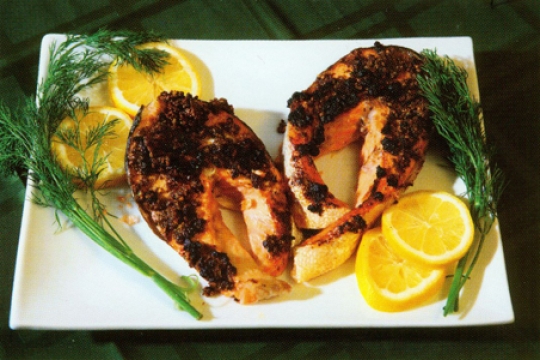To create a little excitement on your grill, add a spice rub that captures the tantalizing taste of the Near East.
Ingredients:
1 Tablespoon ground cumin
1 Tablespoon coriander seed
1 Tablespoon whole black peppercorns
1/3 cup salted pistachio nuts
3 large cloves of garlic, finely chopped
1 Tablespoon candied ginger, finely chopped
1 Tablespoon sweet paprika
1 1/2 teaspoon ground cinnamon
1/2 teaspoon salt
1 teaspoon wildflower honey
3 Tablespoons extra virgin olive oil
1 Tablespoon fresh lemon juice
2 Tablespoons fresh parsley, chopped
1-1/2 pounds fillet of fish, such as swordfish, halibut, tuna, or salmon, 3/4-inch thick
Directions:
- Combine all the ingredients in a small food processor work bowl. Process for 20 seconds or until a coarse paste is formed. Set aside. Alternatively, place the first 5 ingredients in a bowl or plastic bag and press with the back of a spoon or rolling pin until the contents are coarsely crushed. Add the remaining ingredients and set aside.
- Rinse the fish and pat dry.
- Placing a spoonful of spice rub in your hand, rub about 1–2 teaspoons of the spice on each side of the fish, coating well. (Be sure your spoon does not touch your hand, or you will contaminate the rest of the rub on the next spoonful.)
- Allow the fish to sit for 20 minutes at room temperature to absorb the flavors of the rub.
- Grill the fish for 3 minutes per side, or until it is firm but springy to the touch. Your herbs will turn dark, but not burn.
Additional Notes:
- Always choose a firm fish for grilling so it won’t fall apart.
- Never place your brush or hand into the bowl of spice rub, then onto the meat, and back to the marinade. The mixture will be contaminated, and consuming leftovers could pose a serious health risk.
- Never let fish sit in a marinade or rub for longer than 30 minutes; otherwise the acid in the mixture will “cook” the fish, and grilling will cook the same fish twice, making it tough.
- To avoid the smell of fish in your kitchen, remove the paper wrapped around the fish and discard immediately. Most of the time it’s the paper that’s the culprit in bad odors.
Give to the URJ
The Union for Reform Judaism leads the largest and most diverse Jewish movement in North America.



